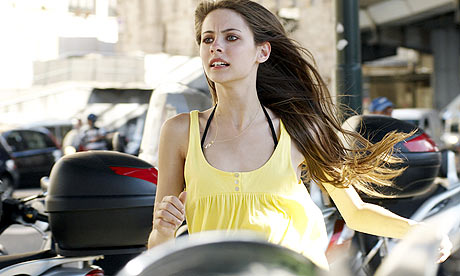Michael Winterbottom’s latest feature, Genova, is the newest addition to an oeuvre which, at this stage of his career, seems to encompass a film from almost every genre. Although more off-kilter than that other famous genre-hopping auteur Stanley Kubrick, Winterbottom is equally adept at crossing the various cinematic divides. If Code 46 was his sci-fi, 9 Songs his, er. . . romance, and A Cock and Bull Story his comedy, then – equally tenuously – Genova could well be his supernatural chiller.
Genova opens with Marianne (the ubiquitous Hope Davis) a young married mother driving a car with her two daughters passengers in the front and back. She is playing happily with her youngest but is paying scant regard to the road. Unsurprisingly, this soon results in an accident which leaves the two daughters traumatised but unhurt and Marianne thoroughly dead. Father Joe, played with typical British stoicism by Colin Firth, subsequently accepts a position at a university in Genova from his friend Barbara (Catherine Keener) and whisks daughters Mary and Kelly away from the overbearing sympathy of family and friends for a new start in an exotic location.
Genova is right from the get-go a Michael Winterbottom film. His trademark tonalities and natural, kinetic camerawork are in abundance throughout; every shot looks like it could have been made on a home video camera or could be taken from the eyes of a person walking down the street right behind the main characters. Through this approach, he creates strong emotional ties and an intimate sense of family – building genuine empathy with his audience that only serves to heighten the impact of the more heartfelt grief scenes and the supernatural elements.
The film packs a real emotional punch as a snapshot of a family dealing with a trauma and trying to move on with their lives. The focus is not on shouty scenes, set-tos and long emotional walks along rainy windswept coastlines with a bottle of whiskey in hand. The film instead acknowledges the scale of personal loss, recognising that something like the death of a family member is simply too big for the cinema screen. It chooses to focus on the impact of loss on the minutiae of the family itself. Genova depicts a young family that has become lost. Each member is lost in their own way, Joe within himself and his work, Kelly within hedonism and discovering her sexuality and Mary, rather chillingly, lost in trauma, guilt and the city.
Examining aspects such as trauma and guilt, Genova is a film that, on many levels, functions as a ghost story. The youngest daughter, Mary, is the prime focus of this aspect of the film. She is the most damaged (at least outwardly) and because she is the youngest. Like countless ghost, horror and supernatural films before it, Genova uses the age-old device of a child to create tension and discomfort. The child is the figure of innocence that can be turned on its head for evil purposes (Children of the Corn, The Omen etc) but also a figure that we naturally want to protect. Genova uses this typical horror trope, creating a connection with Mary and then using our desire for her wellbeing against us. Seeing her screaming for her mother in her sleep and crying uncontrollably is unsettling and upsetting, and while the appearance of Marianne’s ghost is seemingly a comfort to Mary, we know that it can only be a bad thing – either as a signifier of her mental trauma or as some intimidating otherworldly presence. Mary seems as deeply traumatised by the death of a family member as Julie Christie was way back in Don’t Look Now, both of them travelling to foreign places to escape the trauma of bereavement but neither of them being capable of escaping their own feelings of culpability.

Indeed Genova shares other similarities with Don’t Look Now in its recreation of the city as a self. Genova is a simulacra in a sense; it exists as another reality – a place that functions as a means of escape and also the means of totally losing oneself. It acts as a metaphor for grief in Winterbottom’s film, a deeply unsettling place with narrow streets that all look alike, full of falling plates of glass, strange men and incomprehensible dialects. Genova is monstrous in its benign indifference, like death itself, and the family must learn to live in and with it.
A palpable feeling of unease seems to come in and out of the film, which unfortunately lends it an uneven and unbalanced identity. On the one hand, we have a tremendously uncomfortable scene where Joe is searching for Mary in an ever increasing state of panic after a trip to the beach gone wrong; on the other, we see him teaching his students or watching Kelly perform a heart-warming piano recital. While juxtaposing these different elements paints an expressionistic portrait of a family, it doesn’t really help with the overall feel of the film, which seems at times to be at odds with itself. It doesn’t seem to be able to decide if it’s a study in grief, a portrayal of redemption and self-discovery, or a deeply unsettling mood piece.
The film undoubtedly functions effectively within all three modes, but the supernatural elements are its strongest suit. It comes up trumps with Marcel Zyskind’s cinematography, which is almost Blair Witch-like as it follows the disparate family members in their bewildering stumbles throughout Genova, the city of their grief. Kelly’s P.O.V. as she flies across the city on the back of the scooter without a helmet is beautifully captured, evoking the transience of life and of the city itself, making us wonder if she will fall off and if she even cares at all.
Genova is by no means an easy watch but it’s certainly an intriguing one, in which supernatural undertones underpin thoughtful emotional content that really hits home at times. The performances are uniformly excellent: especially from Willa Holland, who is so jaw-droppingly attractive that she easily steals the show from a criminally underused Catherine Keener. Winterbottom purists won’t be disappointed by this showing but others might want to look towards something that isn’t suffering from such an identity crisis.



